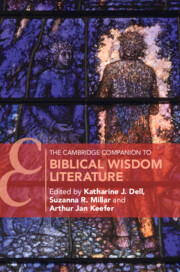Book contents
- The Cambridge Companion to Biblical Wisdom Literature
- Cambridge Companions to Religion
- The Cambridge Companion to Biblical Wisdom Literature
- Copyright page
- Contents
- Contributors
- Acknowledgement
- Abbreviations
- Part I The Context of Wisdom Literature
- 1 Introduction
- 2 The Scope of Wisdom Literature
- 3 The Multiple Genres of Wisdom
- 4 The Literary Context(s) and Development of Wisdom Literature in Ancient Israel (with Special Reference to Proverbs)
- 5 The Scribal World
- 6 Theological Themes in the ‘Wisdom Literature’
- 7 The Solomonic Connection
- Part II Wisdom Literature in the Hebrew Bible
- Part III Wisdom Literature beyond the Hebrew Bible
- Part IV Themes in the Wisdom Literature
- Bibliography
- Index
- Cambridge Companions to Religion
- References
2 - The Scope of Wisdom Literature
from Part I - The Context of Wisdom Literature
Published online by Cambridge University Press: 28 July 2022
- The Cambridge Companion to Biblical Wisdom Literature
- Cambridge Companions to Religion
- The Cambridge Companion to Biblical Wisdom Literature
- Copyright page
- Contents
- Contributors
- Acknowledgement
- Abbreviations
- Part I The Context of Wisdom Literature
- 1 Introduction
- 2 The Scope of Wisdom Literature
- 3 The Multiple Genres of Wisdom
- 4 The Literary Context(s) and Development of Wisdom Literature in Ancient Israel (with Special Reference to Proverbs)
- 5 The Scribal World
- 6 Theological Themes in the ‘Wisdom Literature’
- 7 The Solomonic Connection
- Part II Wisdom Literature in the Hebrew Bible
- Part III Wisdom Literature beyond the Hebrew Bible
- Part IV Themes in the Wisdom Literature
- Bibliography
- Index
- Cambridge Companions to Religion
- References
Summary
Tremper Longman begins the Companion by setting the stage for many of the chapters that follow. Of first importance is the fact that discussing ‘biblical wisdom literature’ is not as simple as it seems. For the category as such has been questioned, and, even among those scholars who agree to use the phrase, what it means and designates remains up for debate. Longman presents the various viewpoints in terms of the ‘traditional view’, reactions to it, and ‘the way forward’. Matters of genre, the grouping of biblical texts, and their social location or worldview arise, as do suspicions about how ‘wisdom literature’ came about within scholarship and a recent repudiation of what it has become. Longman’s way forward indicates that Proverbs, Job and Ecclesiastes do indeed have meaningful affinities, and that these texts can and should be studied together, as well as in relation to other OT texts.
Keywords
- Type
- Chapter
- Information
- The Cambridge Companion to Biblical Wisdom Literature , pp. 13 - 33Publisher: Cambridge University PressPrint publication year: 2022

